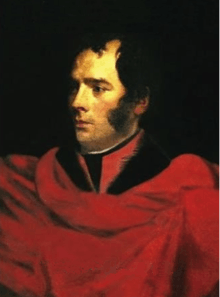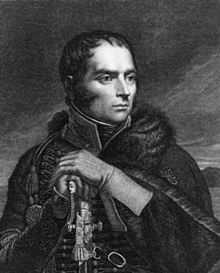Arthur O'Connor (United Irishman)

Arthur O'Connor (4 July 1763 – 25 April 1852), was a United Irishman and later a general in Napoleon's army.
Early life
Born near Bandon, County Cork, O'Connor embraced the Republican movement early on as he was encouraged by the American Revolution overseas. From 1790 to 1795 he was a Member of Parliament in the Irish House of Commons for Philipstown. The Irish House of Commons was part of the colonial parliament that sat in College Green. O'Connor was also a member of the Kildare Street Club in Dublin.[1] His brother Roger O'Connor, author of the Chronicles of Eri, shared his politics. His two other brothers were pro-British loyalists.
United Irishmen
In 1796 he became a member of the Society of United Irishmen. He and Lord Edward Fitzgerald petitioned France for aid in support of an Irish revolution. While traveling to France he was arrested alongside Father James Coigly, a Catholic priest, and three other United Irishmen. Coigly, who found to be carrying an incriminating letter, was hanged, whereas O'Connor was acquitted. He was re-arrested immediately and imprisoned at Fort George in Scotland along with his brother Roger. On his way to confinement,[2] he distributed a poem, which, seeming to recant his republican beliefs, with verses re-ordered, was instead a ringing re-affirmation of them:[3]
(1) The pomp of courts, and pride of kings,
(3) I prize above all earthly things;
(5) I love my country, but my king,
(7) Above all men his praise I'll sing.
(9) The royal banners are display'd,
(11) And may success the standard aid:
(2) I fain would banish far from hence
(4) The Rights of Man and Common Sense.
(6) Destruction to that odious name,
(8) The plague of princes, Thomas Paine,
(10) Defeat and ruin seize the cause
(12) Of France, her liberty, and laws.[1]
- ^ [1] The Monthly Mirror, VII (February 1799), p. 127. The author was identified as Arthur O'Connor in a letter to the editor of Drakard's Paper (later The Champion) on April 14, 1813.Retrieved Feb. 03, 2013.
France

O'Connor was released in 1802 under the condition of "banishment".[4] He travelled to Paris, where he was regarded as the accredited representative of the United Irishmen by Napoleon who, in February 1804, appointed him General of Division in the French army. General Berthier, Minister of War, directed that O'Connor was to join the expeditionary army intended for the invasion of Ireland at Brest.
When the plan fell through, O'Connor retired from the army. In 1807 he married Eliza de Condorcet, the daughter of the scholar the Marquis de Condorcet and Sophie de Condorcet. The couple had a son, Daniel O'Connor (1810-1851). He referred to himself as Arthur Condorcet O'Connor in his subsequent writings.
He offered his services to Napoleon during the Hundred Days. After Napoleon's defeat he was allowed to retire, becoming a naturalised French citizen in 1818. He supported the 1830 revolution which created the July Monarchy, publishing a defence of events in the form of an open letter to General Lafayette. After the revolution he became mayor of Le Bignon-Mirabeau. The rest of his life was spent composing literary works on political and social topics.[5]
Publications
- The Measures of Ministry to Prevent a Revolution: Are the Certain Means of Bringing it on (1794)
- A Letter to the Earl of Carlisle, Occasioned by His Lordship's Reply to Earl Fitzwilliam's Two Letters, Exhibiting the Present State of Parties in Ireland (1795)
- State of Ireland (1798)
- Paddy's Resource: Being a Select Collection of Original and Modern Patriotic Songs: : Compiled for the Use of the People of Ireland (1798)
- The Portrait of an Irish Executive Director, by Himself and His Friends (1799)
- État actuel de la Grande-Bretagne (1804)
- Lettre du général Arthur Condorcet O'connor au général La Fayette: sur les causes qui ont privé la France des avantages de la révolution de 1830 (1831)
- État religieux de la France et de l'Europe d'après les sources les plus authentiques avec les controverses sur la séparation de lÉglise et de l'État, Volumes 1 à 2 (written with François-André Isambert and Charles Lasteyrie, 1844)
- Le monopole, cause de tous les maux (1849)
- To the People of Ireland
See also
References
- ↑ Thomas Hay Sweet Escott, Club Makers and Club Members (1913), pp. 329–333
- ↑ From The Casket - Flowers of Literature, Wit and Sentiment, Vol. 5, P.234. Philadelphia, 1830. Retrieved Feb. 03, 2013.
- ↑ Cited in the article "Bones of Contention" by Christopher Hitchens in The Guardian, Saturday 15 July 2006.Retrieved Feb. 03, 2013.
- ↑ O'Connor at Princess Grace Irish Library. Retrieved Oct. 09, 2007.
- ↑ Extracts from A Biographical Dictionary of Irishmen in France. By Richard Hayes. Published by MH Gill & Sons Ltd. Dublin 1949. Retrieved Oct. 09, 2007.
| Parliament of Ireland | ||
|---|---|---|
| Preceded by John Toler Henry Cope |
Member of Parliament for Philipstown with William Sankey 1790–1795 |
Succeeded by William Sankey John Longfield |
| ||||||||||||||||||
|